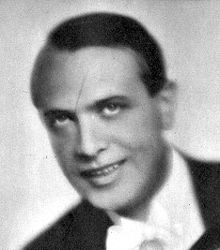Karl Gerhard
Karl Gerhard ( pronunciation : [ ˌkɑːɹl ˈ ʝæːɹhaɖ ], * April 14, 1891 in Stockholm ; † April 22, 1964 in Saltsjöbaden ) actually: Karl Johnson , was a Swedish revue and film actor , theater director and director and songwriter.
Karl grew up in Stockholm and was an actor in traveling theater companies for a long time. As the successor to Ernst Rolf , he began to perform couplets at the Fenix cabaret in Stockholm in 1919 . He wrote his first review under the pseudonym Hvem är hvem (Who is who) but then he took the name Karl Gerhard. In the 1920s, Karl Gerhard competed with Ernst Rolf as a writer and producer of revues. After Rolf's death, Gerhard's revues became more luxurious and he was soon considered the revue king of Stockholm. In some of his revues, such as Oss greker emellan (“Among us Greeks”, Volksoper, Östermalm ) and Köpmännen i Nordens Venice (“The merchant of northern Venice”, same place) Zarah Leander was prima donna. For them, Gerhard wrote the song I skuggan av en stövel ("In the shadow of a boot") in 1934 , which was intended to express his protest against the increasing persecution of Jews in Europe. However, that did not prevent Zarah from moving to Hitler's Germany three years later .
Gerhard's political activities against German National Socialism and the Swedish policy of indulgence were to increase. During a visit to Moscow he borrowed a tune for his best-known anti-fascist song: Den Ökända hästen från Troja ("The Notorious Trojan Horse"), which was sung in the 1940 revue Gullregn ("Goldregen"). The prohibition of this couplet due to an obsolete interpretation of a paragraph of the regulatory law was one of the clearest examples of Sweden's opportunistic attitude and self-censorship during the Second World War. The design of the corresponding scene with a ballet group in Tyrolean hats that came out of a Dala horse was not changed by Gerhard. In return, the horse received a muzzle and a night cap and instead of the couplet, Gerhard read the text of the prohibition and the corresponding paragraph.
After the war, Gerhard wrote multi-volume memoirs ( Om jag inte minns fel , Katt bland hermeliner , Lite gullregn ), performed in two-person pieces with Bo Ekemar , performed his new couplets on the radio and wrote a New Year's revue every year, first in Gothenburg and then was shown in Stockholm. Later he often appeared in revues by Povel Ramel until he directed his last revue in 1961 ( Ursäkta handsken , directed by Tage Danielsson ). In his entire career, Gerhard has also appeared in several Swedish films.
Web links
- Karl Gerhard in the Internet Movie Database (English)
- Karl Gerhard Society (Swedish)
| personal data | |
|---|---|
| SURNAME | Gerhard, Karl |
| ALTERNATIVE NAMES | Johnson, Karl (real name); Hvem är hvem (pseudonym) |
| BRIEF DESCRIPTION | Swedish actor, theater director and songwriter |
| DATE OF BIRTH | April 14, 1891 |
| PLACE OF BIRTH | Stockholm |
| DATE OF DEATH | April 22, 1964 |
| Place of death | Saltsjöbaden |
